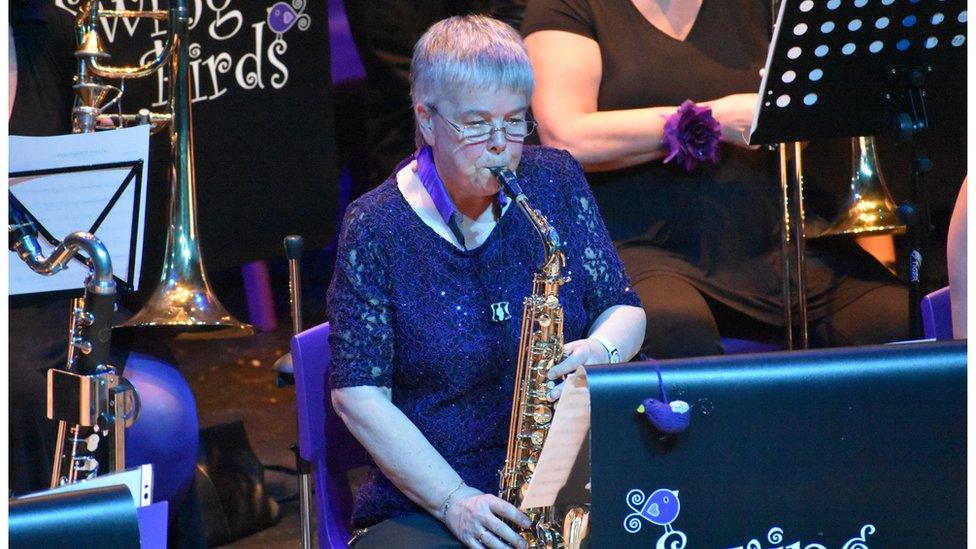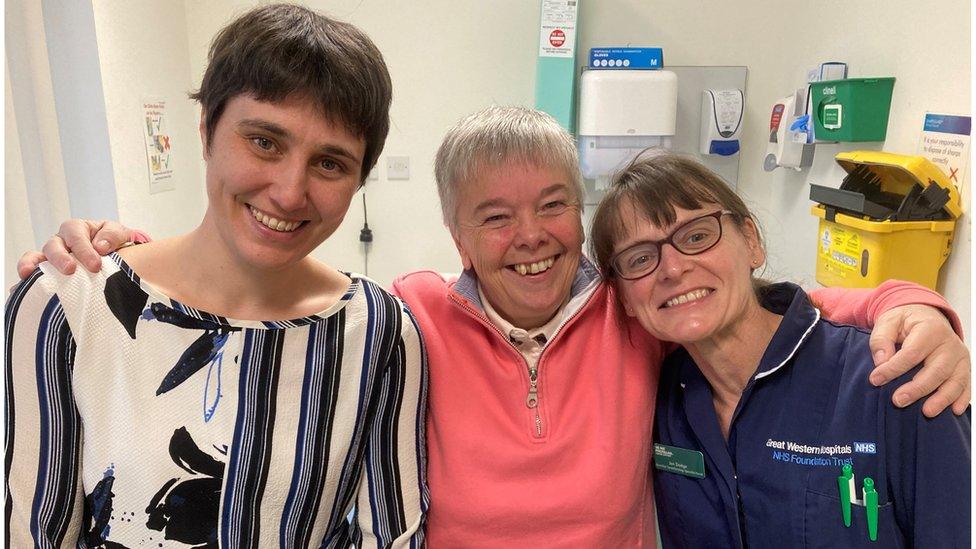Swindon woman warns over endometrial cancer signs
- Published

Three days before her diagnosis, Mo Squires, founder of Swindon's only all female big band, The Swing Birds plays saxophone in a charity gig
A woman from Swindon is urging people to look out for the signs of endometrial cancer.
Mo Squires had an unexpected bleed, 10 years after menopause and was diagnosed with grade three endometrial cancer.
Womb cancer is the fourth most common cancer in women in the UK and the most common of the five gynaecological cancers, more than 9,700 people are diagnosed each year in the UK.
Ms Squires said she had not felt ill making the diagnosis "bizarre".
She had a three-day post-menopausal bleed in July and after reporting it quickly to her GP surgery she was referred to the rapid gynae assessment unit.
After two biopsies Ms Squires was diagnosed with endometrial cancer commonly known as cancer of the womb.
Listen to Mo talking to Ben Prater on BBC Radio Wiltshire here
"I hadn't been feeling ill in fact I was feeling very well and to this day I'm still feeling very well so it's all a little bizarre," she said.
A former project manager, Ms Squires, admitted that her pragmatic approach was a gift in dealing with the diagnosis.
"It was just another project with a series of tasks and we tick them off as we go," she added.

Left to right: Lead Gynae Oncology Consultant Amy Keightly, Mo Squires and Specialist Cancer Nurse, Jan Dodge at Swindon's Great Western Hospital
Cancer of the womb is the most common cancer of the female genital tract and the forth most common cancer in women, Ms Keightley explained.
"It's both on the rise with the number of people being diagnosed but also unfortunately the number of people that are dying from this kind of cancer this is probably related to lifestyle factors particularly being more overweight," Ms Keightley said.
"If you have bleeding again after you've had no period for 12 months [menopause] it's really important that you go and see your GP.
"It's also worth thinking about healthy lifestyle because particularly for this cancer it makes a really big difference both in terms of reducing your risk but also then what treatments we can offer you afterwards."
Ms Squires had a CT scan two days after diagnosis that confirmed the cancer had not spread and she took the decision to have a full hysterectomy.
Ms Keightly explains this is not the lengthy process that people often fear.
"We do these operations now as key hole operations and that means the recovery is significantly quicker and people do a lot better after surgery generally."
Ms Squires agreed.
"The difference between six weeks and 12 weeks for me I'd be going stir crazy if it were 12. I've got a concert on 10 December which will be seven-and-a-half weeks and I feel well enough to do that."
And now with radiotherapy due to finish by Christmas the prognosis is good.
"I actually think I'm in a dream and I'm going to wake up and people are going to say that never happened because I didn't feel ill.
"I still don't feel ill and yet I clearly was so it's all a bit surreal. I'm forever grateful to my GP and everybody I've met ... my experience [treatment] has been world class."

Follow BBC West on Facebook, external, Twitter, external and Instagram, external. Send your story ideas to: bristol@bbc.co.uk